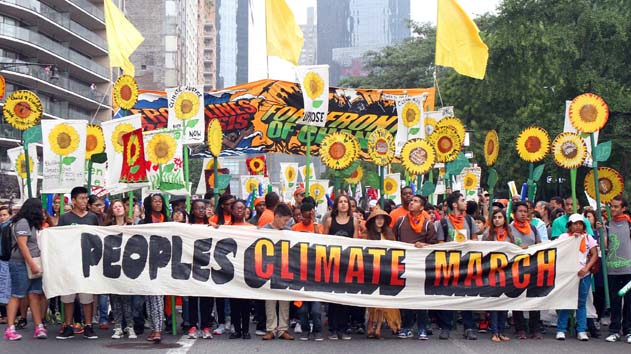Naomi Klein’s new book is a welcome intervention into climate politics. There is a hunger for serious responses to climate change. Over 2000 people turned up to Klein’s book launch in London.
The US and China’s climate deal on the eve of the G20 meeting has put the climate issue back on the political agenda. Obama’s climate announcements may have embarrassed Abbott, but the details are much less impressive.
The agreement is non-binding and any serious cuts are again put off to the never-never, starting sometime after 2020. What the $3 billion Green Fund to help developing countries decarbonise will be spent on hasn’t been specified. But it’s paltry compared with Obama’s new war in Iraq, which will cost an estimated $18 billion to $22 billion each year.
Klein’s book is a useful anti-dote to the solutions on offer. The situation is so urgent that, she argues, “only mass social movements can save us now”. Importantly Klein argues that building a movement against climate change has to go hand in hand with the fight against inequality.
Klein squarely pins the blame for the climate crisis on capitalism. She argues that “market fundamentalism has from the very first moments systematically sabotaged our response to climate change” and that the free market is incapable of delivering the kind of emissions cuts required. She says attempts to limit climate action to fit market logic, with false solutions like carbon trading, carbon offsets, and green consumerism have wasted decades. There are solutions to climate change that will work, she argues, “but the catch is that these also involve changing everything”.
In some of the strongest chapters of the book Klein argues that real solutions require “planning and banning”. Cutting emissions, and a mass roll out of renewable energy and public transport will require, “visionary long term planning, tough regulation of business, higher tax on the affluent, big public sector expenditure, and in many cases reversals of core privatisation”.
Klein is contradictory on carbon taxes, sometimes dismissing them as timid, yet elsewhere welcoming them. However recently on Lateline Klein argued Australia’s carbon tax was “not based on a polluter-pays principle” and “offloaded too much of the burden onto consumers”.
Environment groups
Klein takes a useful swipe at “Big Green” and the mainstream environment movement’s cosying up to corporations. In the US the Environment Defence Fund has gone so far as to argue that “coal is not the enemy” and the Nature Conservancy drills for oil in its own nature reserves. In Australia much of the mainstream environment movement displays the same timidity about challenging corporate interests. They support useless carbon pricing “solutions” on the basis that nothing else is politically possible, rather than trying to build a movement that can change politics. This led them to overwhelmingly back the carbon tax, despite the fact it would have entrenched a useless market mechanism to deal with climate change.
Klein rightly says, “The Green movement’s mantra that climate is not about left and right, but about ‘right and wrong’ has got us nowhere.”
The book is not without its flaws. It could have been much shorter. The chapter on Klein’s efforts to conceive is particularly self-indulgent. The calls for sacrifice in the book “for everyone but the poor” strike a discordant note with the call to address inequality. However it is on the strategy for building a movement that Klein is weakest. She has a scattergun approach that glorifies blockades above all, but also highlights community wind farms and divestment campaigns. She never quite condenses what she thinks are the key demands needed to take the climate movement forward.
Movements
Klein looks at movements historically that have brought massive change, and points to the need to tackle economic vested interests. She points to the strike wave in the US after the Great Depression as one example that forced the bosses to redistribute wealth and saw the introduction of Social Security measures.
Unfortunately Klein never fully follows this logic through. She treats trade unions as just another potential ally in a long list. But the key to fighting for control of the economy is the power of the working class to stop production and interrupt the flow of profits.
This Changes Everything is a much needed ideological shot in the arm for the climate movement. At the end of the book Klein welcomes the potential of the Arab Spring and similar moments of mass resistance, and says, “These moments when the impossible seems suddenly possible are incredibly rare and precious. The next time one arises it must be harnessed not only to denounce the world as it is and build fleeting pockets of liberated space. It must be the catalyst to actually build the world that could keep us all safe.”
By Chris Breen
This Changes Everything: Capitalism vs. the Climate
By Naomi Klein
Allen Lane, $29.99






